How To Ask For Permission To Metal Detect?

Written by Piotr Lesniewski
Detectorist • Scotland
As an Amazon Associate we earn commission from qualifying purchases. Read our full Affiliate Disclosure.
You’re standing at the edge of a promising field, metal detector in hand, but there’s one crucial step before you can start swinging: getting permission.
How you approach landowners makes all the difference between access to pristine detecting grounds and being turned away. The art of securing detecting rights isn’t complicated, but it does require preparation, respect, and understanding what property owners truly care about.
Ready to transform your permission success rate and unlock new treasure-hunting opportunities?
Key Takeaways
- Research property ownership through county records before approaching the landowner.
- Visit in person during convenient times like weekends or early evenings when landowners aren’t busy.
- Introduce yourself clearly, explain your metal detecting intentions, and address any concerns about property damage.
- Offer mutual benefits such as sharing historical findings or helping find lost items on their property.
- Create a written agreement specifying permitted areas, time restrictions, and how found items will be handled.
Before You Approach
Researching the property’s history and ownership status through county records or local historical societies can help you make a compelling case when seeking permission to metal detect.
You’ll want to approach property owners during convenient times, typically avoiding early mornings, mealtimes, or late evenings when they’re likely to be busy or resting. Weekends between mid-morning and early afternoon often provide the best opportunity for a relaxed conversation about your metal detecting request.
Do Your Research
Before approaching any landowner, always complete thorough background work to maximize your chances of success.
Start by identifying the actual property owner, not just tenants or farm workers who lack authority to grant permission. County tax records or land registry offices can provide this crucial information.
Focus on farms with arable land rather than just pasture, as plowed fields often yield better finds. Check local historical records to determine if the area has significance—landowners are more likely to grant permission if they understand the historical context of potential discoveries.
Take time to drive around the property first, familiarizing yourself with access points, farm layout, and active areas. This reconnaissance will demonstrate your seriousness and preparation when you finally approach the landowner.
Timing Matters
The timing of your approach can make or break your request for metal detecting permission. Farmers operate on demanding schedules dictated by seasons and daily chores, so approaching at the wrong moment virtually guarantees rejection.
Avoid busy periods when agricultural operations are in full swing. Never visit during planting, harvesting, or lambing season when farmers are working extended hours and under significant pressure.
Early evening, typically between 6-7 PM, offers your best opportunity. By then, most farmers have completed their daily tasks but haven’t yet settled in for dinner or evening relaxation.
Winter months following harvest provide another ideal window. With fields dormant and workload reduced, farmers generally have more time to consider your proposal.
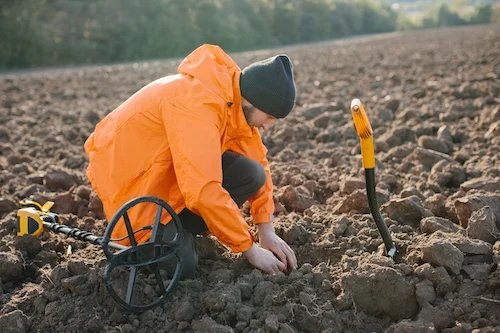
Making First Contact: Asking For Permission To Metal Detect In-Person VS Phone
When should you initiate contact with a landowner about metal detecting permission? While timing matters, your approach is equally important. Face-to-face visits typically yield better results than phone calls, creating an immediate personal connection and demonstrating your sincerity.
Visit the farmhouse and knock on the door rather than approaching workers in fields who may not have authority to grant permission. Introduce yourself clearly:
“Good evening, I’m [name] and I live locally in [area]. I’m wondering if you might consider allowing me to metal detect on some of your land? I’m a responsible detectorist with insurance and would be happy to discuss how this might work.”
If no one’s home, don’t give up. Leave a polite note with your contact details so the landowner can reach you when convenient.
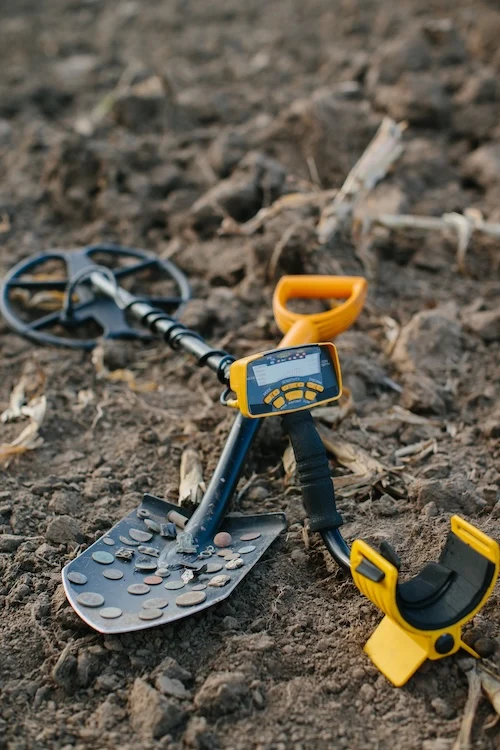
Key Points to Cover When Asking For Permission To Metal Detect
When requesting permission to metal detect on someone’s property, you’ll need to demonstrate you’re a responsible detectorist who follows ethical practices and leaves no trace behind.
Demonstrate Responsibility
Responsibility forms the cornerstone of any successful metal detecting relationship with landowners. When requesting permission, mention that you carry public liability insurance, which protects both you and the property owner in case of accidents.
Assure the landowner you’ll only work on already-disturbed ground like ploughed fields, minimizing any potential impact on their property.
Explicitly promise to fill in all holes and leave gates exactly as you find them—open or closed. This basic courtesy shows respect for their property and livestock safety.
Finally, acknowledge that you understand farming operations and will never interfere with their work. Make it clear you’ll avoid areas with crops, livestock, or active machinery.
Address Their Concerns
Successful permission requests go beyond promises of responsibility to actively address landowners’ specific concerns. Preemptively acknowledge common worries to show you’ve thought through their perspective.
Assure the owner you’ll avoid any areas with livestock or crops, eliminating fears about disturbing their livelihood. Offer flexibility by working only at times that won’t interfere with their regular activities.
Demonstrate consideration by explaining you’ll park carefully without blocking access roads, gates, or driveways.
Finally, make it clear you won’t bring unexpected groups onto their property without explicit permission. This addresses privacy concerns and maintains the personal agreement you’re establishing.
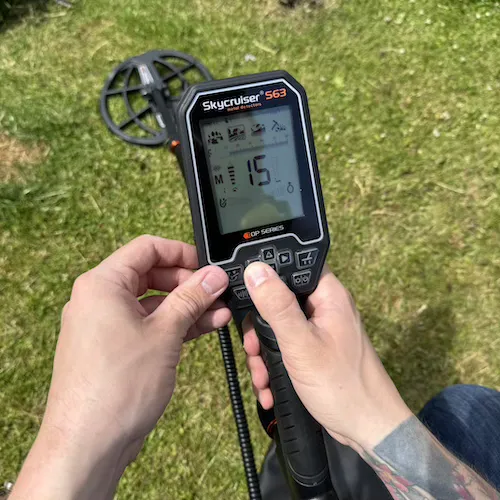
What’s In It For Them
Landowners often perk up when they understand the mutual benefits of allowing metal detecting on their property. Offer to share any interesting historical items you find, especially those connected to the property’s past.
You can also position yourself as an extra pair of eyes on their property. Mention that you’ll report any issues you notice during your detecting sessions, such as broken fences or wandering livestock.
If appropriate, consider offering a small annual permission fee. This gesture shows you value their cooperation and recognize that you’re benefiting from access to their land.
The Written Agreement
Drawing up a simple written agreement can seal the deal once a landowner shows interest in your metal detecting request. Your document should clearly outline:
Specific fields you’re permitted to search
Time restrictions (seasons or times of day)
Ownership arrangements for any finds
Your insurance details and contact information
Agreement duration (typically 6-12 months)
A basic permission letter might read:
“This confirms that [Farmer Name] gives permission to [Your Name] to metal detect on [specific fields] at [Farm Name] from [date] to [date]. Any finds of historical interest will be reported to the Portable Antiquities Scheme and ownership discussed. [Your Name] carries public liability insurance and agrees to fill all holes, respect farming operations, and maintain good relations with local residents.”
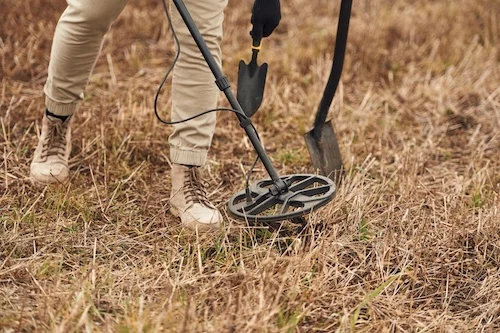
Handling Rejection
Rejection is an inevitable part of seeking permission to metal detect, so you’ll need to handle it gracefully. When landowners decline your request, thank them politely and don’t press for explanations.
Understanding common refusal reasons—liability concerns, previous bad experiences, or privacy issues—will help you improve your approach for future requests.
Stay Professional
How you handle rejection reflects on the entire metal detecting community, so stay gracious and professional.
Always thank landowners for their time, regardless of their answer. Never argue or pressure them to change their mind—this only reinforces negative stereotypes and burns bridges. Instead, politely ask if they know other local farmers who might be open to your hobby.
Before leaving, make sure to say something like, “If you change your mind, please give me a call.” This keeps the door open for future opportunities.
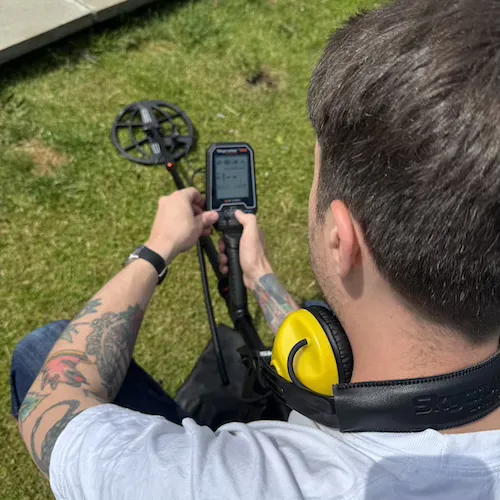
Common Reasons for Refusal For Permission To Metal Detect
Understanding why landowners say “no” can help you better prepare for future requests.
Many property owners have had negative encounters with previous detectorists who left holes unfilled or damaged crops.
Others worry about insurance liability if you’re injured on their property.
Some landowners fear you might damage their land with digging, especially on farms or manicured lawns.
Finally, many people simply value their privacy and don’t want strangers wandering their property.
Build Long-Term Relationships
Building strong, lasting relationships with property owners requires you to prove yourself trustworthy after gaining permission. Share your finds, respect their property, and always leave areas in better condition than you found them.
Don’t forget to maintain regular contact with landowners, sending thank-you notes, occasional updates, or even sharing a portion of valuable finds to show your appreciation.
Prove Yourself
The foundation of any successful metal detecting permission is what happens after you get that initial “yes.”
Start with a small section of the property as promised, even if they offer more. This shows respect for boundaries and builds trust.
Always fulfill every commitment you make—whether it’s time limits, areas to avoid, or how you’ll leave the property.
When you’ve finished, take time to share your findings. Property owners are often genuinely curious about what’s beneath their soil. Even if you found nothing valuable, showing this follow-through demonstrates your integrity.
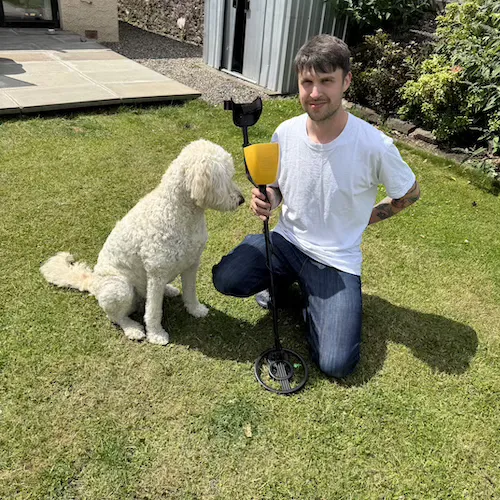
Maintain Contact
Successfully proving yourself as a trustworthy detectorist opens the door to something even more valuable—ongoing access.
After your initial hunt, send a thank-you note with photos of interesting (not necessarily valuable) finds and explain their historical significance.
Don’t disappear for months only to reappear when you want to detect again. Instead, nurture the relationship throughout the year. Share interesting articles about local history, drop off seasonal gifts, or offer to help with property tasks occasionally.
Remember, you’re building a relationship, not just accessing land.
Success Tips
When requesting permission to metal detect, your appearance and demeanor create crucial first impressions that property owners notice immediately.
Appearance Matters
First impressions can make or break your request. When approaching landowners, dress neatly and ensure you’re well-groomed.
Your vehicle is an extension of your presentation. Drive a clean, tidy car and park considerately without blocking driveways or access points.
Always bring professional business cards or written contact information. This simple preparation demonstrates organization and accountability.
Local Knowledge
Showing familiarity with the area can significantly boost your chances. Research the property’s history before approaching the owner—knowing about local historical events or former structures demonstrates your genuine interest.
When conversing with farmers, be ready to discuss their operation. Simple questions about crop rotation or livestock show you value their profession, not just their land.
Local knowledge creates common ground and shows you’re not just a random hobbyist looking to dig holes.
Be Honest
Honesty forms the foundation of successful permission requests. When approaching property owners, admit upfront that you’re hoping to find interesting artifacts.
Be transparent about your experience level. If you’re a beginner, say so – many landowners find enthusiasm more appealing than pretended expertise.
Remember that permission is a privilege, not a right. Your straightforward approach demonstrates respect for the landowner’s property and decision-making authority.
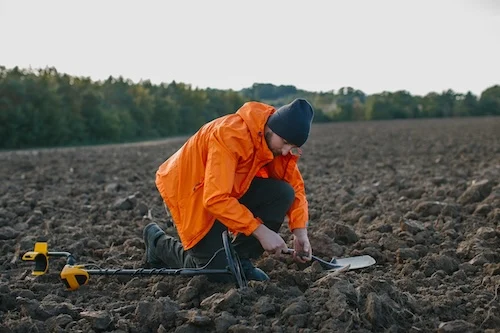
Remember, most farmers deal with many requests for Permission To Metal Detect
Farmers are constantly approached by salespeople, hunters, photographers, and others seeking access to their land. Your metal detecting request is just one of many they field regularly.
When you approach a farmer, understand you’re asking for a favor from someone who’s likely heard similar requests dozens of times. They may have had negative experiences with people who damaged property or didn’t respect boundaries.
Be patient and gracious whether they say yes or no. If declined, thank them politely and move on. Don’t take rejection personally. Remember that for every few “no” responses, you’ll eventually get a “yes” that could lead to a fantastic detecting site.
Conclusion
You’ll find most property owners appreciate honesty and respect when you ask to metal detect. Don’t be discouraged by rejection—it’s part of the process. Always follow through on your promises, share interesting finds, and express gratitude. With patience and persistence, you’ll build relationships that last for years. Remember, each permission granted isn’t just access to land—it’s an opportunity to preserve history.
Author Profile

Piotr Lesniewski
"Digging up the past, one signal at a time."
Polish-born, Scotland-based, and obsessed with the beep. My passion began decades ago, exploring fields with my Dziadek (grandfather). Now, with over 10 years of digging under my belt, I'm here to share everything I've learned—unfiltered and unbiased—to help you unearth your own piece of history. No sales pitches, just real field experience.